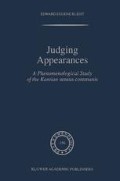Abstract
A richly woven connection between the contemplation of appearances and the act of judgment lies dormant in the Western philosophical tradition. Hannah Arendt has brought to our attention the pre-platonic sense of theōria as the viewing of an appearing action or imitation of action such as tragic drama by perspectivally situated spectators. The dramatic ritual would provide a forum for the practice of the spectators’ judgment, a practice echoed in the function of the chorus within the drama. As is well known, Plato gave quite a different sense to the word theōria,retaining the semantic component of visibility as the vehicle for a philosophical metaphor connected with other metaphors of vision such as idea and eidos. Two faces emerge from the meaning of theōria in Plato’s own use: a mystical and a dialectical aspect.1 The mystical aspect exerted a far more profound influence on Neoplatonism, which could be said to begin already in Aristotle’s conception of nous as thought thinking itself and which secures a firm place in Plotinus’s mystical fusion of Platonic ascent and Aristotelian teleology.2 In Plotinus the dialectical aspect of theōria disappears and has no further significant influence upon the Neoplatonist tradition before Leibniz.3 Plato himself had objected to the judgmental nature of theōria in the pre-platonic sense because that earlier meaning had made theōria the source of doxa,meaning both fame and opinion. The development of Neoplatonism from Plotinus to Leibniz had left this pre-platonic meaning dormant. Typically in the Neoplatonism which had ignored the dialectical aspect of Plato’s thought, and particularly in the monastic tradition, contemplation requires solitude.4
Access this chapter
Tax calculation will be finalised at checkout
Purchases are for personal use only
Preview
Unable to display preview. Download preview PDF.
Bibliography
1. Works by Kant: All original texts cited from the Academy Edition (AK)
Kant, Immanuel. Kants gesammelte Schriften, Edited by Königlich Preußische Akademie der Wissenschaften. Berlin: Walter de Gruyter and Predecessors, 1902-
The following editions were consulted
—Kritik der praktischen Vernunft. 10th edition. Edited by Karl Vorländer with a bibliography by Heiner Klemme. Hamburg: Felix Meiner Verlag, 1990.
—. Kritik der reinen Vernunft. Edited by Raymund Schmidt. Hamburg: Felix Meiner Verlag, 1926.
—, Kritik der Urteilskraft. Edited by Karl Vorländer. Hamburg: Felix Meiner Verlag, 1924.
The following translations were consulted or quoted (sometimes with slight alterations)
Allison, Henry. The Kant-Eberhard Controversy: an English translation together with supplementary materials and a historical-analytic introduction of Immanuel Kant’s On as Discovery According to Which Any New Critique of Pure Reason Has Been Made Superfluous by an Earlier One. Baltimore: Johns Hopkins University Press, 1973.
Kant, Immanuel, Anthropology from a Pragmatic Point of View. Translated by Mary J. Gregor. The Hague: Martinus Nijhoff, 1982.
—. Critique of Judgment. Translated by Werner S. Pluhar. In dianapolis: Hackett Publishing Co., 1987.
—. Critique of Practical Reason. Translated by Lewis White Beck. Indianapolis: Bobbs-Merrill, 1956.
—. Critique of Pure Reason. Translated by Norman Kemp Smith. New York: St. Martin’s Press, 1929.
—. Kant: Philosophical Correspondence 1759–1799. Edited and Translated by Arnulf Zweig. Chicago: University of Chicago Press, 1967.
—. Lectures on Logic. Translated by J. Michael Young. Cambridge: Cambridge University Press, 1992.
—. Perpetual Peace and other Essays. Translated by Ted Humphrey. Indianapolis: Hackett Publishing Company, 1983.
—. Theoretical Philosophy 1755-1775. Translated and edited by David Walford in collaboration with Ralf Meerbote. Cambridge: Cambridge University Press, 1992.
Author information
Authors and Affiliations
Rights and permissions
Copyright information
© 2000 Springer Science+Business Media Dordrecht
About this chapter
Cite this chapter
Kleist, E.E. (2000). Introduction: A Phenomenological Approach. In: Judging Appearances. Phaenomenologica, vol 156. Springer, Dordrecht. https://doi.org/10.1007/978-94-011-3931-1_1
Download citation
DOI: https://doi.org/10.1007/978-94-011-3931-1_1
Publisher Name: Springer, Dordrecht
Print ISBN: 978-1-4020-0258-8
Online ISBN: 978-94-011-3931-1
eBook Packages: Springer Book Archive

